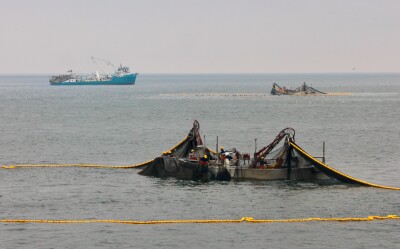Sometimes when I want to check out what the world is saying about commercial fishing, I'll go to Twitter and type "commercial fishing" in the search box. A sampling from today includes links to a video about commercial fishermen in Gaza struggling with Israeli restrictions and an article on how "China is using its immense commercial fishing fleet as a surrogate navy" for clashes in the contested waters in the South Asian Sea (the fleet has 695,555 vessels, making it the biggest in the world and double the size of the next largest, Japan.)
Sorry for the distraction. That's what these social media sites do — distract. Often the distractions that come up about commercial fishing will be negative. There are many users who "care about the oceans" (a favorite phrase) and use platforms like Twitter to sound off on commercial fishing. Yet, they know very little about the industry they're criticizing.
I care about the oceans too, and the health of our planet, but I don't think it's productive to constantly point fingers at commercial fishing while ignoring the growing threats of climate change, acidification and pollution. I remember learning during a pretty basic science class in high school that the pollution you can't see is often more of a threat to the environment than the visible. That's the problem that commercial fishermen have: You are a visible target.
During my time at National Fisherman I've been lucky to meet interesting, hardworking people whose idea of a typical day in the office is of course anything but. While it can be a struggle to not know what you're going to bring home each day, I think commercial fishermen also enjoy the challenge of keeping up with the fish within the parameters of time and fuel.
Commercial fishermen, advocates and bloggers alike make their thoughts known on Twitter. Screenshot via TwitterThose challenges make great stories. Keep telling your stories through good reporting at your local newspapers and blogs. These writers are always looking for material to write about, so if you feed them some juicy stories (with some education about fisheries to boot) you'll probably get a bite.
I believe in the power of stories, and you guys have the best ones. Providing greater understanding will hopefully allow for greater flexibility. For example, when fish move because of warming waters, will management and science acknowledge that change or blame the fishermen? Commercial fishermen need friends wherever they can find them during these changing and sometimes challenging times.
As our Senior Editor Linc Bedrosian pointed out to me when I shared this blog, commercial fishermen are both visible and invisible. You're an easy target to pick on, yet nobody really sees you because when you're off fishing, you're out of sight and out of mind to the general public.
Some are visible. If you go to Twitter and type in "commercial fishing," you'll see there's a good group of bloggers (some are also commercial fishermen) sharing those good stories. You can follow National Fisherman's Editor Jessica Hathaway @NFJes. If you want to follow me, I'm @melissafwood. Thanks!







